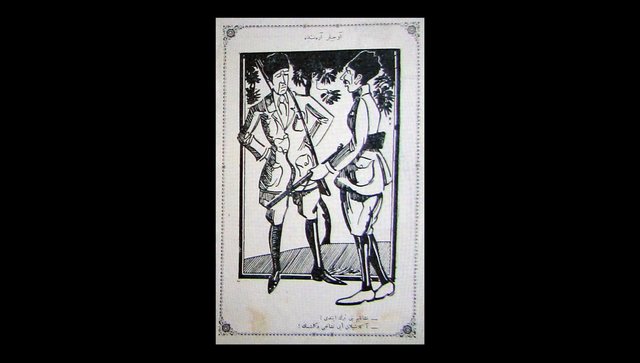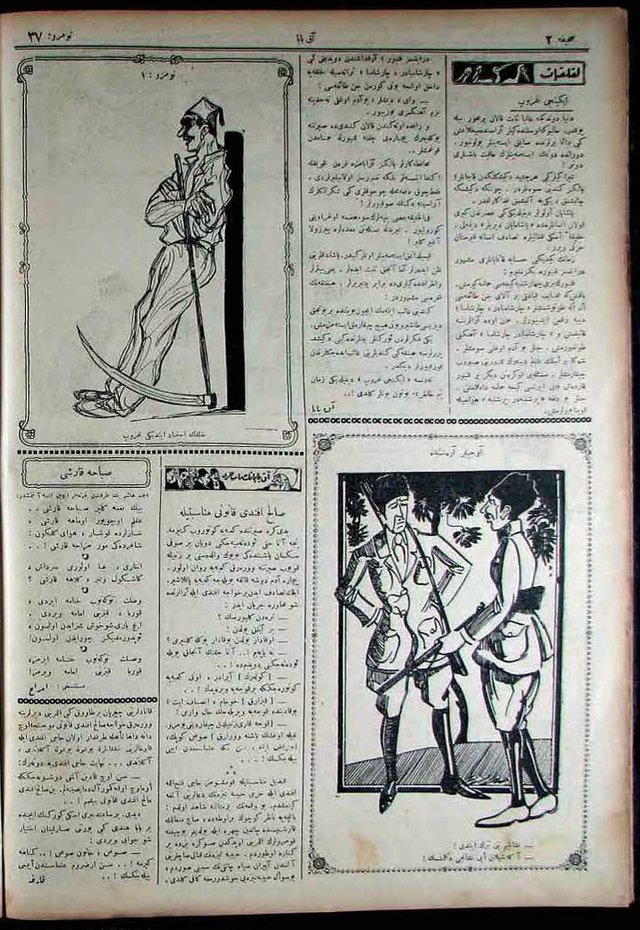145. Today in 1920s Turkey: 12 April 1923 (Hunters in the Forest of Love)

(Cartoon, Akbaba or “Vulture/White-Bearded Old Man,” 12 April 1923, no. 37, page 2.)
Türkçe:
(Üstte) Avcılar arasında
(Altta)
—Nişanlım beni terk etti!
—Anlaşılan iyi nişancı değilmişsin!
English:
(Above) Between hunters
(Below)
—My fiancée left me!
—Apparently you are not a good marksman!
Comments
The cartoon medium often employs both text and image to communicate an idea or narrative. A multi-faceted, well-integrated, or otherwise successful cartoon will often work its humor into the text and image equally, although sometimes one element is favored over the other. In the case of the current cartoon its humor lies in the text not the image, which serves as a mere illustration. That said, the text itself is not terribly witty. For those only reading the English version, the crux of this joke is lost in translation but its original Turkish is not that better and suffers from a lack of complexity. The joke is rooted in the coincidence that the word for fiancée (nişan-lı) shares the same root as the word for marksman (nişan-cı). A nişan is both an engagement and target. As such, the man whose engagement was broken is naturally bad at engagements and therefor, according to his companion, bad at aiming his rifle.
Taken at face value, this joke elicits more of an eye-roll than a chuckle, even in its native context. Even though it is not an example of the pinnacle of humor, it serves to illustrate some of the simple ways in which language lends itself to silliness especially when certain words can mean multiple things (homonyms).
Of course, given the conjugal nature of the dilemma, it is possible that the joke is more layered than our first impression affords. Maybe the cartoonist had an unsatisfying sense of humor, or maybe there is more to the joke than is immediately apparent to me, the reader… Maybe I failed to bring the correct set of knowledge to the table. Perhaps the “engaged/marksman” semi-pun created by the use of the words nişanlı/nişancı is meant to function as a double entendre revolving around the notion of a target/accomplishment. Meaning that if the hunter failed at obtaining a spouse he will likely fail at obtaining game during the hunt. According to his companion, this shortcoming could be a result of his bad aim. This concept in particular could have sexual connotations. It is not uncommon for the hunt to be compared to the pursuit of other forms of carnal sustenance. Thus, the failure of the engagement may be attributed to the would-be groom’s poor “aim”—a skill that perhaps he has already demonstrated to his now ex-fiancée. As such, the truthful friend suggests that if the hunter’s fiancée left him, he should seek fault in himself.

(Entire page, Akbaba or “Vulture/White-Bearded Old Man,” 12 April 1923, no. 37, page 2. Hakkı Tarık Us Collection, Beyazıt Library, Istanbul.)
i love the old cartoony pictures you post...!! beautiful to get a glimpse of Turkish artwork from the twenties... thank you for that...!
Thank you kindly @elohibaluk ! I'm glad you're enjoying them. It's a real pleasure to work with such interesting materials:)
🌷😃
Hello @yasemin-gencer, thank you for sharing this creative work! We just stopped by to say that you've been upvoted by the @creativecrypto magazine. The Creative Crypto is all about art on the blockchain and learning from creatives like you. Looking forward to crossing paths again soon. Steem on!
Thanks @creativecrypto !
This post has been modified, updated, and re-posted on 12 April 2019. Access the new edition here.